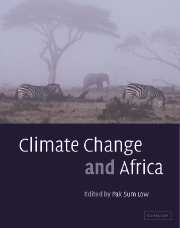Book contents
- Frontmatter
- Contents
- Notes on contributors
- Peer reviewers
- Editor's note
- Foreword
- Foreword
- Foreword
- Foreword
- Preface
- Preface
- Preface
- Preface
- List of abbreviations
- List of SI prefixes
- List of unit abbreviations
- List of chemical formulae
- Part I Science
- Part II Sustainable energy development, mitigation and policy
- 10 Biomass energy in sub-Saharan Africa
- 11 Natural resources: population growth and sustainable development in Africa
- 12 Sustainable energy development and the Clean Development Mechanism: African priorities
- 13 Opportunities for clean energy in the SADC under the UNFCCC: the case for the electricity and transport sectors
- 14 Regional approaches to global climate change policy in sub-Saharan Africa
- 15 Energy for development: solar home systems in Africa and global carbon emissions
- 16 Climate change in sub-Saharan Africa: assumptions, realities and future investments
- 17 Climate-friendly energy policies for Egypt's sustainable development
- Part III Vulnerability and adaptation
- Part IV Capacity-building
- Part V Lessons from the Montreal Protocol
- Index
10 - Biomass energy in sub-Saharan Africa
Published online by Cambridge University Press: 10 December 2009
- Frontmatter
- Contents
- Notes on contributors
- Peer reviewers
- Editor's note
- Foreword
- Foreword
- Foreword
- Foreword
- Preface
- Preface
- Preface
- Preface
- List of abbreviations
- List of SI prefixes
- List of unit abbreviations
- List of chemical formulae
- Part I Science
- Part II Sustainable energy development, mitigation and policy
- 10 Biomass energy in sub-Saharan Africa
- 11 Natural resources: population growth and sustainable development in Africa
- 12 Sustainable energy development and the Clean Development Mechanism: African priorities
- 13 Opportunities for clean energy in the SADC under the UNFCCC: the case for the electricity and transport sectors
- 14 Regional approaches to global climate change policy in sub-Saharan Africa
- 15 Energy for development: solar home systems in Africa and global carbon emissions
- 16 Climate change in sub-Saharan Africa: assumptions, realities and future investments
- 17 Climate-friendly energy policies for Egypt's sustainable development
- Part III Vulnerability and adaptation
- Part IV Capacity-building
- Part V Lessons from the Montreal Protocol
- Index
Summary
Keywords
Biomass energy; sub-Saharan Africa; flowchart; deforestation; health; fuel switching
Abstarct
In sub-Saharan Africa available evidence suggests that biomass use for energy has increased roughly in proportion to population growth. With urbanization the biomass energy sector is becoming more commercialized, and consumption of charcoal is increasing (which leads to higher biomass consumption, given the low conversion efficiencies in most charcoal production). Localized fuel scarcity and resource degradation has occurred, but biomass scarcity has been exaggerated in the past in macro-level studies, which overlooked many non-forest sources of biomass fuel. National studies of biomass availability and use in Kenya, Zimbabwe, Sierra Leone, Botswana, Rwanda, South Africa and Uganda indicate that large unused biomass resources exist, and that scarcity often leads to more efficient use and fuel-switching to other forms of biomass rather than to fossil fuels. Consumption of biomass energy in sub-Saharan Africa is not expected to fall in the near future. Therefore there is an urgent need for recognition of the opportunities and problems which dependence on biomass energy represents. The resource is large and potentially sustainable, but biomass use creates health problems and can cause environmental degradation. National and regional energy planning and policies must take into account the importance of biomass energy supply and use, and seek to modernize the sector so that problems can be minimized.
- Type
- Chapter
- Information
- Climate Change and Africa , pp. 107 - 112Publisher: Cambridge University PressPrint publication year: 2005
- 2
- Cited by



